International Peace Bureau
The International Peace Bureau (IPB) (French: Bureau international de la paix), founded in 1891,[1] is one of the world's oldest international peace federations. Its membership consists of 300 organizations in 70 countries.[2] IPB's headquarters is located in Berlin, Germany with offices in Barcelona, Spain, and Geneva, Switzerland. Prior to 2017, the headquarters was based in Geneva.
 | |
| Abbreviation | IPB |
|---|---|
| Motto | Disarmament for Development |
| Formation | 1891 |
| Type | NGO |
| Legal status | Nonprofit |
| Purpose | Dedicated to a world without war |
| Headquarters | Berlin, Germany |
| Coordinates | 52.522454°N 13.383641°E |
Region | Worldwide |
| Methods | Seminars and Conferences, Education, Advocation |
| Fields | World peace |
Co-President | Lisa Clark |
Co-President | Philip Jennings |
Main organ | Assembly of the International Peace Bureau |
| Website | www.ipb.org |
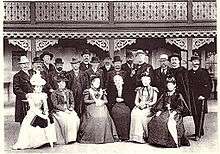
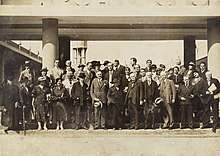
Its main programmes are the Global Campaign on Military Spending (GCOMS) and disarmament for development, which focuses both on nuclear and conventional weapons, as well as biological weapons, landmines, and small arms.[2][3]
IPB holds Consultative Status with the United Nations Economic and Social Council (ECOSOC) and associate status with the United Nations Department of Global Communications.[4]
IPB was founded under the name Permanent International Peace Bureau (Bureau International Permanent de la Paix). From 1912 onward it used the name International Peace Bureau. Between 1946 and 1961, it was known under the name International Liaison Committee of Organizations for Peace – ILCOP (Comité de liaison international des organisations de paix – CLIOP).
The organisation was awarded the Nobel Peace Prize in 1910 for acting "as a link between the peace societies of the various countries".[5][6] In 1913 Henri La Fontaine was also awarded the Prize "[For his work as] head of the International Peace Bureau".[7][8] As of 2012, eleven other Nobel Peace Prize laureates have been members of the IPB.[9]
Global Campaign on Military Spending
The Global Campaign on Military Spending (GCOMS) is a permanent, global, year-round campaign that was created in December 2014 by the IPB to tackle the worldwide issue of excessive military spending.[10]
The aim of the campaign is to pressure the world's governments to invest money in the sectors of health, education, employment and climate change rather than military. It also calls for an annual, minimum reallocation of 10% from the military budgets of all states. Finally, it advocates the reduction of arms production and international weapons trade.[11]
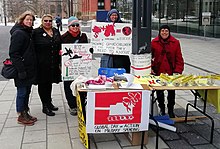
The campaign organises the Global Day of Action on Military Spending (GDAMS) to bring public, media and political attention to the costs of military spending and the need to invest in new priorities.[12]
GCOMS is managed from the decentralized Barcelona, Spain office of IPB in coordination with Centre Delàs of Peace Studies. More than 100 organizations from 35 countries have joined the campaign.[13]
Nuclear Disarmament Activism
IPB has been in the forefront of nuclear disarmament activities since 1945, including:
- Treaty on the Non-Proliferation of Nuclear Weapons (NPT)
- Comprehensive Nuclear-Test-Ban Treaty (CTBT)
- World Court Project
- Treaty on the Prohibition of Nuclear Weapons (TPNW)
Currently, the IPB is campaigning to encourage the signing and ratification of the TPNW so that it may enter into force.[14]
Seán MacBride Peace Prize
Established in 1992, the Seán MacBride Peace Prize is awarded by the International Peace Bureau to a person or organisation that "has done outstanding work for peace, disarmament and/or human rights." [15][16] It is named after Seán MacBride, a Nobel Peace Prize winner who was chairman of the IPB from 1968–74 and president from 1974-1985.[17][18]
Recipients
The following are the recipients of the Seán MacBride Peace Prize since its inception in 1992: [15]
| Year | Recipient | Notes | Reference |
|---|---|---|---|
| 1992 | Michael D. Higgins | ||
| 1993 | Motarilavoa Hilda Lini | Played a key role in the WHO’s decision to approve a request to the World Court on the legal status of nuclear weapons. | |
| 1994 | Mordechai Vanunu | Sentenced to 18 years solitary confinement for revealing details of Israel’s nuclear arsenal. | |
| 1995 | The Committee of Soldiers' Mothers of Russia | Foremost among Russian citizens’ groups opposing the war in Chechnya. | |
| 1996 | Selim Bešlagić | For "his fight against nationalism, ethnic cleansing and intolerance during his country's war." | [19] |
| 1997 | Seeds of Hope Group | For disarming a Hawk aircraft bound for Indonesia. | |
| 1998 | John Hume | For "his contribution to the Northern Ireland peace process." | [20] |
| 1999 | Barbara Gladysch | For her "extraordinary and year-long commitment to disarmament and practical solidarity with victims of wars and disasters." | [21] |
| 2000 | 1) Praful Bidwai 2) Achin Vanaik |
For being at the "forefront of the international campaign against the nuclearisation of South Asia." | [22] |
| 2001 | Rosalie Bertell | For "her lifelong engagement to the cause of peace and for her deep concern for the well-being of peoples all over the planet. | [23] |
| 2002 | Barbara Lee | For "her sole vote against the bombing of Afghanistan." | [24] |
| 2003 | Nihon Hidankyō | Survivors of the A bomb attacks on Hiroshima and Nagasaki in 1945. They have devoted the rest of their lives to the elimination of nuclear weapons. | |
| 2004 | Geneva Initiative on the Middle East | ||
| 2005 | No award made | ||
| 2006 | Mayors for Peace: 1) Tadatoshi Akiba |
For "its achievements in arousing international public demand for the abolition of nuclear weapons and lasting world peace." | [25] |
| 2007 | Jayantha Dhanapala | For "his dedication to the cause of disarmament and his initiatives towards creating the Central Asian Nuclear-Weapons Free Zone." | [26] |
| 2008 | Jacqueline Cabasso | For "her years of outstanding work with NGOs and initiatives toward peace and the abolition of nuclear weapons." | [27] |
| 2009 | Betty Reardon | For "her contribution to peace education and to the wider peace movement." | [28] |
| 2010 | Binalakshmi Nepram | For "her extraordinary efforts to promote disarmament and an end to gun violence in India." | [29] |
| 2011 | 1) Hanaa Edwar 2) Dr. Peter Becker |
1) For "her contribution to the advancement of democracy and human rights, as well as her firm stand against violence and war;" 2) For his work with the German section of the International Association of Lawyers Against Nuclear Arms (IALANA). |
[30][31] |
| 2012 | 1) Lina Ben Mhenni 2) Nawal El Saadawi |
For showing "great courage and ... substantial contributions to what is known as the Arab Spring." | [32] |
| 2013 | Chelsea Manning | For her "courageous actions in revealing information about US war crimes." | [33] |
| 2014 | The People and Government of the Republic of the Marshall Islands | For "courageously taking the nine nuclear weapons-possessing countries to the International Court of Justice to enforce compliance with the Non-Proliferation Treaty and international customary law." | [34] |
| 2015 | The People and the Island Communities of Lampedusa, Italy and Jeju Island, South Korea | For showing "a profound commitment to peace and social justice." | [35] |
| 2016 | IPB Secretary-General Colin Archer | For 26 years "in the service of peace and of the IPB community." | [36] |
| 2017 | 1) All Okinawa Council Against Henoko New Base 2) Noam Chomsky 3) Jeremy Corbyn |
1) For "its unflagging commitment to close the Futemna Marine Air Base, and for its nonviolent opposition to the construction of a massive new air, land and sea base in Henoko;" 2) For his "tireless commitment to peace, his strong critiques to U.S. foreign policy, and his anti-imperialism;" 3) For his "sustained and powerful political work for disarmament and peace." |
[16] |
| 2018 | 1) Association For Historical Dialogue and Research and Home for Cooperation 2) Helena Maleno 3) Douglas Roche |
1) For its "efforts and promotion of [a] Culture of Peace and as well as the peace building activities;" 2) For her "efforts to save hundreds of lives in the Mediterranean Sea, and her strong commitment to defending human rights;" 3) For his "tireless efforts to promote international peace and disarmament." |
[37] |
| 2019 | 1) Bruce Kent
2) Elayne Whyte Gómez |
1) An "internationally known peace activist and a 'real peace hero' who, even in his 90th year, remains an active campaigner and organizer for peace and human rights."
2) For "her invaluable contribution to the completion of the historic Treaty on the Prohibition of Nuclear Weapons." |
[38] |
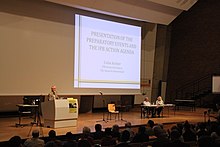
Leadership
At the Triennial Assembly held in London on October 19 2019, a new group of IPB officials was elected.[39]
President
The current Co-Presidents are:[39]
| Country | Name |
|---|---|
| Philip Jennings | |
| Lisa Clark |
Vice-Presidents
The Vice-Presidents deputise for the President when necessary. The current Vice-Presidents are: [39]
| Country | Name |
|---|---|
| Jordi Calvo | |
| Corazon Valdez Fabros | |
| Joseph Gerson | |
| Dave Webb |
Board Members
The board members are the following persons: [39]
| Country | Name |
|---|---|
| Alain Rouy | |
| Arielle Denis | |
| Binalakshmi Nepram | |
| Enkhsaikhan Jargalsaikhan | |
| Jun Kyu Lee | |
| Patricia Perez | |
| Rieko Asato-Kodama | |
| Yeshua Moser-Puangsuwan | |
| Steve Staples | |
| Etienne De Jonghe |
Council Members
The Council members are the following persons:[39]
| Country | Name |
|---|---|
| Surender Singh Rajpurohit | |
| Kwaku Addai | |
| Lisa Silvestre | |
| A-Young Moon | |
| Sara Medi Jones | |
| Chloé Meulewaeter | |
| Angelo Cardona | |
| Emily Rubino | |
| Ann Wright | |
| Jurvey Balkrishna | |
| Ejimole Fidel Onwuekwe | |
| Oleg Viktorovich Bodrov | |
| Tamara Lorincz | |
| Jenny Clegg | |
| Stephan Möhrle |
Staff Members
The staff members are the following persons:[39]
| Country | Name |
|---|---|
| Reiner Braun | |
| Amela Skiljan | |
| Quique Sánchez |
Nobel Peace Prizes
IPB's work was rewarded by the Nobel Peace Prize in 1910, which has also been awarded to some of its members:[40]
- 1901 : Frédéric Passy (France), IPB Council Member
- 1902 : Élie Ducommun and Albert Gobat (Switzerland), first honorary secretaries of IPB.
- 1905 : Bertha von Suttner (Austria), writer and honorary vice-president of IPB.
- 1907 : Ernesto Moneta (Italy), IPB Council Member.
- 1908 : Fredrik Bajer (Denmark), honorary president of IPB.
- 1910 : The International Peace Bureau.
- 1911 : Alfred Fried (Austria), IPB Council Member.
- 1913 : Henri La Fontaine (Belgium), president of IPB.
- 1927 : Ludwig Quidde (Germany), IPB Council Member.
- 1959 : Philip Noel-Baker (United Kingdom), IPB Vice-President.
- 1962 : Linus Pauling (United States), IPB Vice-President.
- 1974 : Seán MacBride (Ireland), IPB Chairman and President.
- 1982 : Alva Myrdal (Sweden), IPB Vice-President.
Presidents
The IPB has a Co-President system that ensures for a gender-balance among leadership. Each president can currently serve up to two terms of 3 years.[41]
- Henri La Fontaine – 1907–1943[42]
- Ernst Wolf – 1963–1974
- Seán MacBride – 1974–1985
- Bruce Kent – 1985–1992
- Maj Britt Theorin – 1992–2000
- Cora Weiss – 2000–2006
- Tomas Magnusson – 2006–2013
- Ingeborg Breines – 2009–2016
- Reiner Braun – 2013–2019
- Lisa Clark – 2016–Present
- Philip Jennings – 2019–Present
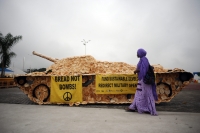
See also
References
- "Over a Century of Peace-Making". International Peace Bureau. Archived from the original on 2013-04-15. Retrieved 2012-02-14.
- "IPB - Who we are | IPB - International Peace Bureau". Retrieved 2020-06-22.
- "Homepage -". demilitarize.org. Retrieved 2020-06-22.
- "IPB - Who we are | IPB - International Peace Bureau". Retrieved 2020-06-22.
- "Award Ceremony Speech (1910)". Nobel Foundation. Retrieved 2011-10-06.
- "The Nobel Peace Prize 1910". Nobel Foundation. Retrieved 2011-10-06.
- Lundestad, Geir (2001-03-15). "The Nobel Peace Prize, 1901–2000". Nobel Foundation. Retrieved 2011-10-06.
- "The Nobel Peace Prize 1913". Nobel Foundation. Retrieved 2011-10-06.
- "IPB Nobel Prize Winners". Nobel Foundation. Archived from the original on 2012-07-18. Retrieved 2011-10-06..
- "Who We Are". Global Campaign on Military Spendin. International Peace Bureau. Retrieved November 6, 2018.
- "What We Do". Global Campaign on Military Spendin. International Peace Bureau. Retrieved November 6, 2018.
- "GCOMS (Global Campaign on Military Spending)". Centre Delàs. Centre Delàs. Retrieved November 6, 2018.
- "Who we are -". demilitarize.org. Retrieved 2020-06-22.
- "Nuclear Weapons | IPB - International Peace Bureau". Retrieved 2020-06-22.
- "Sean MacBride Peace Prize". International Peace Bureau. International Peace Bureau. Retrieved November 6, 2018.
- "IPB Unveils the Winners of Séan MacBride Peace Prize 2017". Centre Delàs. Centre Delàs. September 7, 2017. Retrieved November 6, 2018.
- Nordlinger, Jay (2012). Peace, They Say: A History of the Nobel Peace Prize, the Most Famous and Controversial Prize in the World. Encounter. p. 221.
- "International Peace Bureau Awards Sean MacBride Peace Prize 2013". Pax Christi International. Pax Christi International. Retrieved November 6, 2018.
- "Bosnian wins MacBride prize". The Irish Times. Dublin. August 27, 1996. Retrieved November 7, 2018.
- "MacBride Prize for Hume". The Irish Times. Dublin. October 14, 1998. Retrieved November 7, 2018.
- "Barbara Gladysch erhält den MacBride-Friedenspreis 1999" [Barbara Gladysch receives the MacBride Peace Prize 1999]. Peace Forum (in German). Bonn: Netzwerk Friedenskooperative (Network of the German Peace Movement). Winter 1999. Retrieved November 7, 2018.
- "Peace Bureau to Award MacBride Prize to Indian Anti-Nuclear Activists". Archived from the original on 25 February 2004. Retrieved 7 November 2018.
- "Peace Bureau Awards Prize to Dr Rosalie Bertell". CADU News. Campaign Against Depleted Uranium. Winter 2001. Retrieved November 7, 2018.
- Irwin, Abrams; Gungwu, Wang (2003). Iraq War and Its Consequences, The: Thoughts of Nobel Peace Laureates and Eminent Scholars. World Scientific. p. 131. ISBN 9789814338103.
- "Mayors for Peace Receives Sean MacBride Peace Prize Awarded by the International Peace Bureau(IPB)". Mayors for Peace. Hiroshima Peace Culture Foundation. Retrieved November 7, 2018.
- "UNU Council Chair Dhanapala Wins IPB Peace Prize". United Nations University. United Nations University. September 2007. Retrieved November 7, 2018.
- "Ms.Jacqueline Cabasso, the Mayors for Peace Coordinator in North America won 2008 Sean MacBride Peace Prize". Mayors for Peace. Hiroshima Peace Culture Foundation. n.d. Retrieved November 7, 2018.
- "International Peace Bureau Awards Pioneering Peace Educator, Dr. Betty A. Reardon, the 2009 Sean MacBride Peace Prize". Archived from the original on 2010-07-13. Retrieved 2018-11-07.CS1 maint: BOT: original-url status unknown (link)
- "Binalakshmi Nepram Receives Sean MacBride Peace Prize for 2010 in Oslo". Heinrich Böll Stiftung India. Heinrich Boell Foundation. September 23, 2010. Retrieved November 7, 2018.
- "Hanaa Edwar from the Iraqi Al-Amal Association Awarded the Sean MacBride Peace Prize 2011 by International Peace Bureau". Archived from the original on 2012-08-15. Retrieved 2018-11-07.CS1 maint: BOT: original-url status unknown (link)
- "International Peace Bureau awards the Sean MacBride PeacePrize 2011 to Hanaa Edwar (Iraqi women's rights and democracy activist) and Peter Becker (German anti-nuclear lawyer)" (PDF). Archived from the original on 2011-12-02. Retrieved 2018-11-07.CS1 maint: BOT: original-url status unknown (link)
- "International Peace Bureau to Award 2012 Sean MacBride Peace Prize to Nawal El-Sadaawi (Egypt) and Lina Ben Mhenni (Tunisia)". Action from Ireland. Action from Ireland. November 8, 2012. Retrieved November 6, 2018.
- "International Peace Bureau awards the Sean MacBride Peace Prize 2013 to US whistleblower Bradley Manning". Canadian Voice of Women for Peace. Canadian Voice of Women for Peace. July 23, 2013. Retrieved November 6, 2018.
- "MacBride Peace Prize to the Marshall Islands". Abolition 2000. Abolition 2000. August 5, 2014. Retrieved November 6, 2018.
- "International Peace Bureau to Award the 2015 Macbride Prize to Two Island Communities: Lampedusa (Italy) and Gangjeon Village, Jeju Island (S. Korea)" (PDF). International Peace Bureau. International Peace Bureau. August 24, 2015. Retrieved November 6, 2018.
- "IPB to Award Sean MacBride Peace Prize 2016 to Colin Archer". Pressenza. Pressenza. November 11, 2016. Retrieved November 6, 2018.
- "Press Release: Seán MacBride Peace Prize 2018" (PDF). International Peace Bureau. International Peace Bureau. September 12, 2018. Retrieved November 11, 2018.
- "Sean MacBride Peace Prize | IPB - International Peace Bureau". Retrieved 2020-06-23.
- "Structure | IPB - International Peace Bureau". Retrieved 2020-06-09.
- "Nobel Peace Prize Laureates". International Peace Bureau. Archived from the original on 2016-04-15. Retrieved 2016-03-01.
- "Structure | IPB - International Peace Bureau". Retrieved 2020-06-22.
- "The Nobel Peace Prize 1901-2000". Nobelprize.org. Nobel Media AB 2014. Web. 1 Mar 2017. <http://www.nobelprize.org/nobel_prizes/themes/peace/lundestad-review/index.html>
Sources
- Gobat, Albert, Développement du Bureau international permanent de la paix. Bern, 1910.
- Herz, Ulrich, The International Peace Bureau: History, Aims, Activities. Geneva, 1969.
- From Nobel Lectures, Peace 1901-1925, Editor Frederick W. Haberman, Elsevier Publishing Company, Amsterdam, 1972.
External links
| Wikimedia Commons has media related to International Peace Bureau. |
| Wikiquote has quotations related to: International Peace Bureau |
